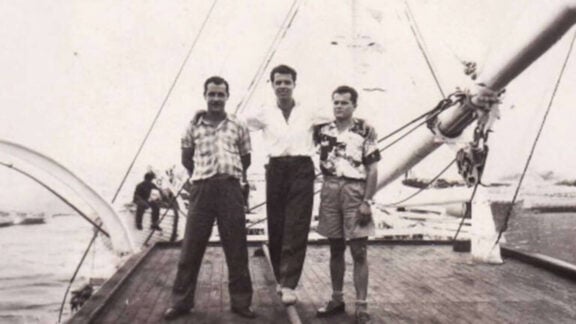There is an image every Greek who remembers the 1980s is familiar with. It is the picture of a beautiful woman, with wild, curly hair and a sweet face, holding a tambourine. It is a picture that epitomises the optimism of the era, the mirthful and festive tendency of Greeks at the time.
This image − or rather, two different versions of it − appears on two consecutive albums by Glykeria, both live recordings, from 1983 and 1985, when the singer was enjoying unparalleled popularity, combining rebetika, traditional songs from Asia minor with contemporary laika. It was at that time that she first visited Australia, an experience that she has always cherished.
“I had just had my first major hits in Greece and my albums could be found in Australia, some in bootleg copies, made in Malaysia, but it doesn’t matter,” she laughs.
“I came with two great singers, Nikos Papazoglou and (Cretan legend) Charalambos Garganourakis, and we had a grand orchestra, featuring traditional clarinet virtuoso Yannis Vailopoulos. There was a lot of anticipation in Australia for our concerts, they longed for everything Greek. We were surrounded by people crying and waving Greek flags. People here embraced me and treated me like one of their own.
“It’s been the same every time I’ve come back since. They always honour me with their presence, they are very responsive to my concerts, we always have a great time and I think it all goes back to the foundation of our relationship, to that first visit.
“For me, this relationship is something that comes straight from the heart; after all, every family in Greece has someone who migrated, even a distant relative who left and they haven’t seen for a long time. I myself have a cousin who got married and came to Australia years ago. I saw her when I last played at the Lonsdale St Festival − she’s now a grandmother”.
Glykeria herself tries to nurture this relationship by carefully choosing the songs she will perform when she visits the country.
“This time around, I’m bringing along a wonderful singer, Gerasimos Andreatos, so we will sing many laika, which I love, but also some of the Asia Minor songs and selections of the repertoire of my favourite singers. I might sing one of my new songs, Patrida, because I think the lyrics will speak to Greek Australians.” She refers to the verses: ‘Those who think they hurt you/ beloved country/ but as much as they hit a rock/ it remains a rock forever/ and if a vineyard dries out/ if an olive tree bends/ it will be reborn and blossom in the world.”
This may sound like a commentary on the current plight of Greece, after eight years of crisis, but a lot of the songs she has sung can be retroactively seen as such commentary, not least among them the anthemic hit about 5,000 drachma notes, which itself epitomised the bouzoukia culture of the ’80s and which sounds especially ironic now that the currency debate is being reheated.
“Imagine that, when the song was written, Greece had not yet been printing 5,000 drachma notes,” she laughs. “Even at the time it was prophetic.”
With a career now spanning four decades, the singer has been in a position to closely observe the transformation of Greek society.
“Singing is a popular art form, it reflects on what is happening in the community,” she says. “All this poverty and misery and helplessness is a reality. There are people in Greece who can’t afford to eat, who look in garbage bins for food. These are not just words − everyone knows about this situation and it is not likely that it will change any time soon. There’s no light at the end of the tunnel, we’re pressed on every side. Greeks are depressed, they are not a joyous people anymore.”
This may be the most dramatic reform inflicted upon the psyche of a nation which is not unfamiliar with poverty and hard times, but has always had the ability to somehow maintain high morale and find a way to be jovial.
Within this context, singing can play a very important role. “Singers used to work seven days a week. Then gigs became more and more scarce. Now a singer is lucky if they work one night a week,” Glykeria says. “And when you see people coming to see you onstage, and know this is a luxury for them, the song itself can be a catalyst. It is no small feat to be able to get into people’s souls and comfort them, even for five minutes. This brief sense of joy might be the stepping stone that will let them move on from grief. But to establish that, you need to have sincerity in your communication and true love.
“You need to really love your fellow human being to be able to transmit this kind of emotion and then you can realise, that in the end, applause is not directed towards the artist, it’s a personal outburst, a celebration of one’s uplift.”
This is the essence of Glykeria’s art − that she has always managed to create an opportunity for festivity and fun without a hint of compromise, in either aesthetics or quality.
“I didn’t do it on purpose”, she says, as if being asked to apologise. “It happened because I am who I am and because I sing the songs I choose to sing and I treat people the way I feel I should.”








